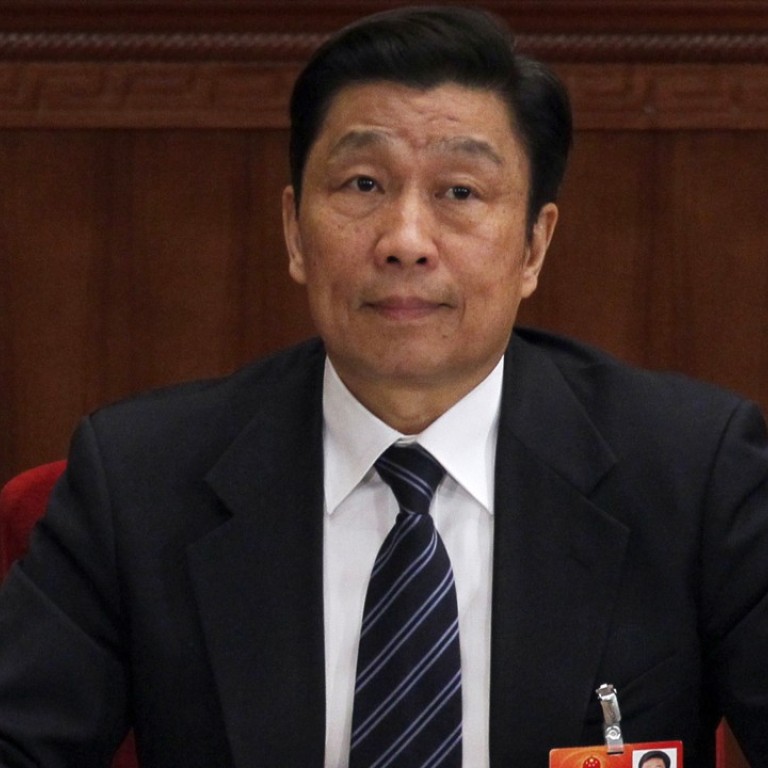
No place for Hu Jintao stalwart among Xi’s new Communist Party power brokers
Li Yuanchao’s political career looks to be over without the chance of a seat on the Politburo, analysts say
Chinese Vice-President Li Yuanchao has failed to gain a seat on the Communist Party’s biggest leadership body, a move that will deny him a place on the decision-making Politburo and possibly force his retirement.
Seen as a protégé of former president Hu Jintao, Li was not among the 204 people named to the Central Committee on Tuesday, even though at 66 he has yet to reach the party’s unwritten retirement age.
Analysts said there had been other signs that Li was on the way out but Tuesday was further proof that President Xi Jinping had cemented his rule by defying the norms set by previous leaders.
Nabil Alsabah, a researcher with the Berlin-based Mercator Institute for China Studies, said Li’s political career looked to be over.
“It is a further indication that Xi Jinping has such power that he can let Li go,” Alsabah said.
Over the years, the party has adhered to an unwritten “seven up, eight down” rule, forcing Politburo members 68 or older into retirement and allowing others to stay on if they are 67 or younger. Analysts say the practice has contributed to China’s peaceful power transitions over the past two decades.
“Seniority is a very important rule in China’s political system,” Alsabah said. “As long as you don’t reach the age and are not accused of wrongdoings, you advance in your career.”
Observers will also be watching on Wednesday to see if the president goes against another precedent by refusing to elevate a successor-apparent to the Politburo Standing Committee.
Li was considered a high-flyer when he joined the Politburo in 2007. A member of the Communist Youth League faction – Hu’s power base – Li was head of the party’s Organisation Department, overseeing top personnel appointments during Hu’s second term.
But a shadow fell over his prospects in 2012 when he failed to join the seven-member Politburo Standing Committee along with Xi.
Five months later, he took on China’s vice-presidency, a figurehead position with no specific responsibilities. Unlike Xi, who became vice-president in 2008 as successor-in-waiting, Li has performed mostly ceremonial tasks. Most Chinese media reports on Li this year have been about him entertaining overseas guests, including a Thai princess and the Kuwaiti court affairs minister.
He also attended the funeral of former Singaporean leader Lee Kuan Yew in 2015 as Xi’s “special envoy”.
Nevertheless, Li has stayed in office while many of his associates have fallen from power in the past five years, caught up in Xi’s anti-corruption campaign.
In 2015, Li’s former associate and Jiangsu official Zhao Shaolin was expelled from the party for forming political factions and “courting and corrupting other senior cadres”.
And this year, Jiangsu vice-governor Li Yunfeng was stripped of party membership for violating discipline. He was the director of the provincial party committee’s general office between 2003 and 2006, when Li Yuanchao was the coastal province’s party chief.
Without Central Committee membership, Li Yuanchao is expected to step down as vice-president at the National People’s Congress in March. Analysts said he was most likely to retire, but could be given an advisory post.
Born in the eastern Jiangsu province, Li studied mathematics at the elite Fudan University in Shanghai. His father was a vice-mayor of Shanghai in the 1960s.
He was seen as a moderate reformist for advocating for intra-party democracy and elections at the grass-roots level.
As an official in Jiangsu, Li attended a governance training programme at the Harvard Kennedy School.
In an article published by People’s Daily in 2007, he stressed the need for strong party leadership but also warned against personality cults, which he said had led to damaging consequences such as the Cultural Revolution.

